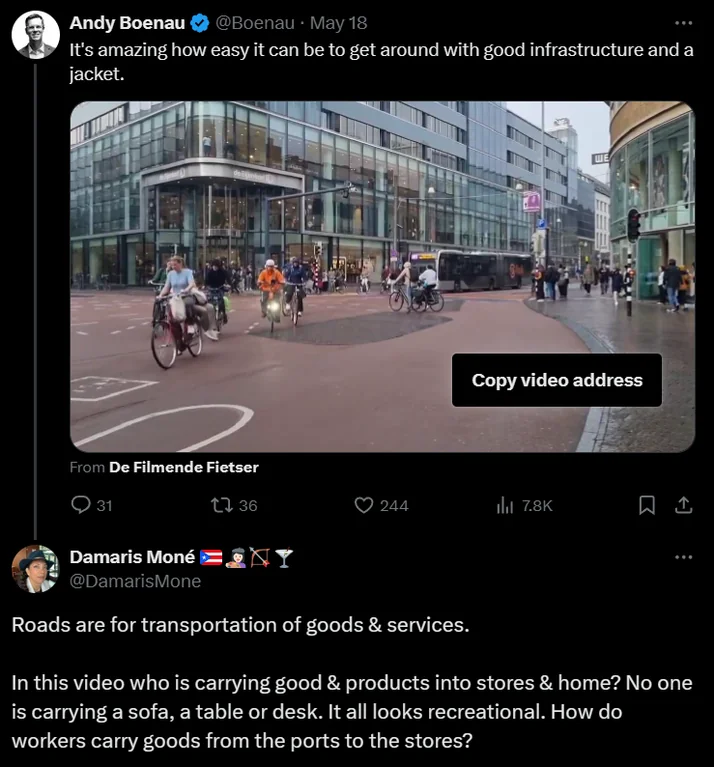Fuck Cars
This community exists as a sister community/copycat community to the r/fuckcars subreddit.
This community exists for the following reasons:
- to raise awareness around the dangers, inefficiencies and injustice that can come from car dependence.
- to allow a place to discuss and promote more healthy transport methods and ways of living.
You can find the Matrix chat room for this community here.
Rules
-
Be nice to each other. Being aggressive or inflammatory towards other users will get you banned. Name calling or obvious trolling falls under that. Hate cars, hate the system, but not people. While some drivers definitely deserve some hate, most of them didn't choose car-centric life out of free will.
-
No bigotry or hate. Racism, transphobia, misogyny, ableism, homophobia, chauvinism, fat-shaming, body-shaming, stigmatization of people experiencing homeless or substance users, etc. are not tolerated. Don't use slurs. You can laugh at someone's fragile masculinity without associating it with their body. The correlation between car-culture and body weight is not an excuse for fat-shaming.
-
Stay on-topic. Submissions should be on-topic to the externalities of car culture in urban development and communities globally. Posting about alternatives to cars and car culture is fine. Don't post literal car fucking.
-
No traffic violence. Do not post depictions of traffic violence. NSFW or NSFL posts are not allowed. Gawking at crashes is not allowed. Be respectful to people who are a victim of traffic violence or otherwise traumatized by it. News articles about crashes and statistics about traffic violence are allowed. Glorifying traffic violence will get you banned.
-
No reposts. Before sharing, check if your post isn't a repost. Reposts that add something new are fine. Reposts that are sharing content from somewhere else are fine too.
-
No misinformation. Masks and vaccines save lives during a pandemic, climate change is real and anthropogenic - and denial of these and other established facts will get you banned. False or highly speculative titles will get your post deleted.
-
No harassment. Posts that (may) cause harassment, dogpiling or brigading, intentionally or not, will be removed. Please do not post screenshots containing uncensored usernames. Actual harassment, dogpiling or brigading is a bannable offence.
Please report posts and comments that violate our rules.
view the rest of the comments

What's a concrete, real way to fix these cities that doesn't require millions of people to give up their homes to move into more-expensive apartments they don't own, addresses the fact that being outside for more than a few minutes simply isn't safe for a significant portion of the population for almost half the year, and doesn't significantly add to commute times?
I don't live in the US so maybe I'm mistaken but in my opinion a possibility could be :
Wait for a small group of houses in the suburbs to be available (preferably towards the center) and transform them in convenience stores, schools, office space, etc
Next you can link multiple suburbs like that with train/tram or metro for exemple. And you can even leave roads connecting zones for delivery or for people needing to go to another town or things like that
Couple that to a good public transport system overall and now you're living in a space were there's less danger due to car circulation, you don't need to drive multiple km to do groceries, kids can walk(or commute via PT) to school, etc
Edit: Naturally this would not be feasible in a year or two but I can easily see this implemented in 5 to 10 year time
Do you think we don't have offices, schools, and C-stores in the suburbs?
We also have sidewalks, bike lanes, walkable shopping districts, etc, but in Texas they don't get used because it's 110° for months at a time and you don't want to have to take a shower every time you change locations.
But the problem is those C-stores and small offices don't bring the jobs required to support the suburbs. Most people have to work in the city, so they have to commute, and getting from their house to the office is what creates traffic.
I'll accept that maybe my vision of the suburbs is biased by films and TV shows 😅
I live in a city where temperature could realistically go to 110° F (that's about 40~45° C for me) in summer but here bus and tram have AC and there is water fountains (decorative and drinkable) everywhere + the city try to maintain vegetation despite heat waves. So even if it's hot outside, felt air temperature is actually way cooler.
I'll admit this is very dependent of where you live, the climate around you, water availability and other things, but certainly it's doable in some places of the US. For others places, in between accomodations can be found. Walkable cities are not a black and white sets of solution there's levels, hierarchical implementations, etc
Absolutely. I work in the planning department of a municipality that's a tiny enclave for the super-wealthy. The average new home here is over 10 times the price of the regional average. I recently issued a permit for a 5,000 square-foot guest house with a tennis pavillion on the roof.
Our residents don't want neighbors. They don't want a sense of cummunity. They want their special enclave with a police force that exists to keep out the homeless people from the major city that surrounds us.
I don't live here of course. I have to drive 90 minutes every morning because my annual salary won't cover a week's mortgage for some of these houses.